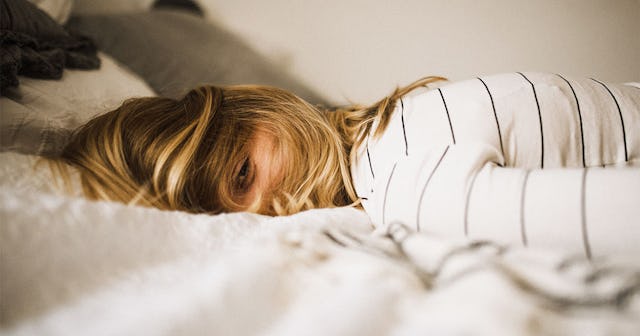Being In A Hetero Marriage Doesn't Make Me Less Bisexual

I am bisexual, but you probably have no idea.
Part of me, because of my heteronormative lifestyle, doesn’t even feel as if I have the right to claim it. I’ve never been harassed, and probably never will be. I never had to fight for my basic civil rights: I got married without a problem. No one has ever yelled at me for kissing my significant other in public or expressed distress over my choice of a partner. I’ve never had to come out to my mom. I didn’t earn it, somehow, so I feel as if I don’t have the right to the LGBTQIA umbrella. But it’s right there: that third letter. The B. I’m the B sandwiched in the middle there, but the one you don’t see. I’m the privileged one who realized her bisexuality late in life, and who had already made all the choices concurrent with life in a heteronormative society before she had the chance to realize it was even a choice.
I’m a passing bisexual. I hear about how bisexuality is made up, it’s about people looking for attention, it’s about uncertainty or an overactive sex drive. Wrong, wrong, wrong. I’m not bisexual for any of those reasons. I’m bisexual because I’m attracted to both men and women. Period. Sometimes I say something. Usually I don’t. I’m privileged about that too — I don’t have to tell you — because I live a different lifestyle than many bisexual women. I, unlike so many other, have a choice.
But that choice doesn’t take away who I am.
I didn’t come to the realization until my mid-thirties, when I started reading and writing girl/girl erotica. And all of a sudden it clicked: all those “girl crushes,” the times I thought it was “just a phase” or “just that girl” or “some weird feeling.” I liked girls as well as guys. I like girls a hell of a lot, in fact. Enough that I’d like to explore that option, given the chance (which I won’t have, for a variety of reasons).
But you don’t see me. To everyone outside the LGBTQIA community, I’m not “in” the community.
I’m a cis woman married to a cis guy, with three kids. I drive a minivan. We have 2.5 dogs (I suspect one is part raccoon), live in a house in the suburbs, and go hiking on the weekends. You see us looking sporty in our Patagonia and traipsing up mountains with our little moppets. We watch football. We like Halloween.
No one sees me. My bisexual identity is erased in the heteronormity of my life. No one imagines the soccer mom thinks other soccer moms might be hot.
Most women are aware of their sexuality at a young age, and many or most who identify as gay or bisexual go on to have same-sex relationships. But according to Science Alert a large, long-term study found that “sexual identity and attraction undergo extensive and often subtle changes throughout a person’s life, continuing long past adolescence and into adulthood, with women showing slightly more fluidity than men.”
So yes: you can discover that you’re bisexual when you’re in your mid-to-late thirties. In fact, I know a large community of women online who also discovered their sexuality later in life. We talk sometimes about the isolation we feel.
This erasure even happens at the holiest of holies: the Pride Parade. Even though I was wearing a rainbow shirt that read, “Becoming Me Was The Greatest Creative Project of My Life,” I had kids and husband in tow, so people probably assumed I was an ally, not LGBTQIA myself. I get it. I would have made the same assumption.
But it’s still part of who I am. I had to come out to my husband. That was bad enough. He sort of — okay totally — flipped out, and I still don’t think he really believes me. When you find out about a new part of yourself, when your journey of self-discovery actually yields results, you want to shout it from the rooftops. You want to tell people: guess what I found out. You want to wear the flag and buy the T-shirt.
If I put a bisexual flag on my minivan, my in-laws will lose their goddamn minds.
If I tell my kids I’m bisexual, and they tell my in-laws I’m bisexual, my in-laws will lose their goddamn minds.
So we talk about the term a lot, often through the lens of David Bowie. I tell my kids they can grow up and like girls or boys or both or neither. “I could marry a girl,” I said casually once. “But I married daddy.” They accepted this without question. I didn’t use the term. But the point came across. And for a second, even if it was only my kids, someone saw me.
I was grateful.
This article was originally published on